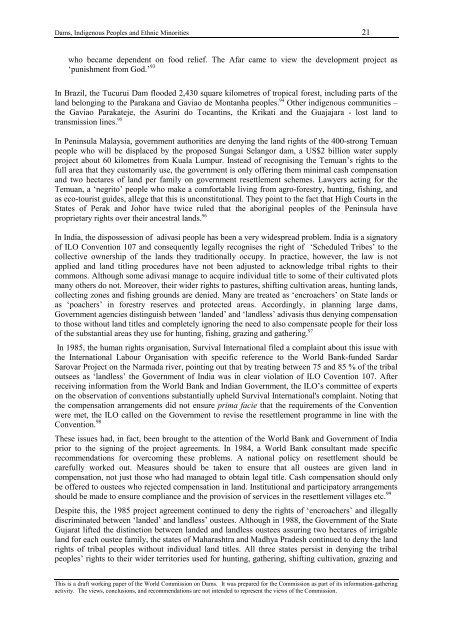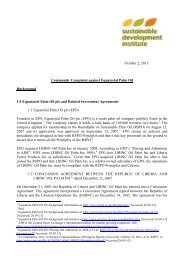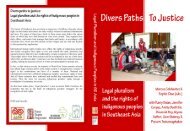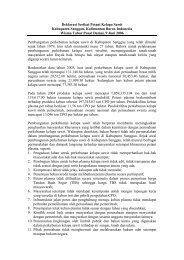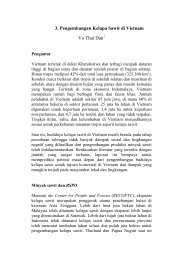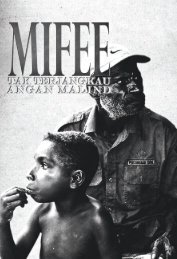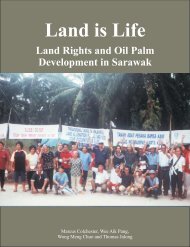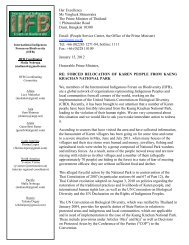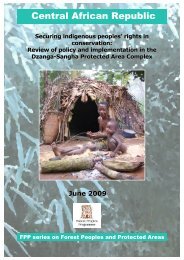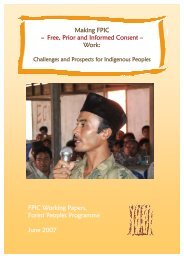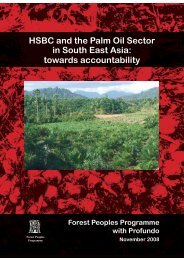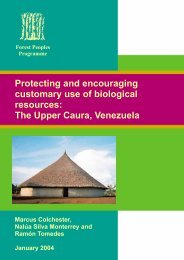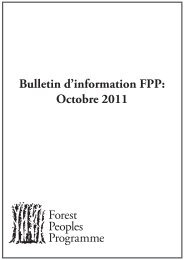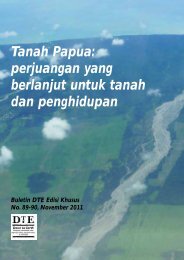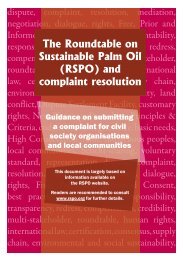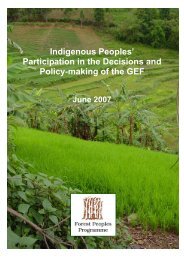Thematic Review II.2: Dams, Indigenous Peoples and Ethnic Minorities
Thematic Review II.2: Dams, Indigenous Peoples and Ethnic Minorities
Thematic Review II.2: Dams, Indigenous Peoples and Ethnic Minorities
Create successful ePaper yourself
Turn your PDF publications into a flip-book with our unique Google optimized e-Paper software.
<strong>Dams</strong>, <strong>Indigenous</strong> <strong>Peoples</strong> <strong>and</strong> <strong>Ethnic</strong> <strong>Minorities</strong> 21<br />
who became dependent on food relief. The Afar came to view the development project as<br />
‘punishment from God.’ 93<br />
In Brazil, the Tucurui Dam flooded 2,430 square kilometres of tropical forest, including parts of the<br />
l<strong>and</strong> belonging to the Parakana <strong>and</strong> Gaviao de Montanha peoples. 94 Other indigenous communities –<br />
the Gaviao Parakateje, the Asurini do Tocantins, the Krikati <strong>and</strong> the Guajajara - lost l<strong>and</strong> to<br />
transmission lines. 95<br />
In Peninsula Malaysia, government authorities are denying the l<strong>and</strong> rights of the 400-strong Temuan<br />
people who will be displaced by the proposed Sungai Selangor dam, a US$2 billion water supply<br />
project about 60 kilometres from Kuala Lumpur. Instead of recognising the Temuan’s rights to the<br />
full area that they customarily use, the government is only offering them minimal cash compensation<br />
<strong>and</strong> two hectares of l<strong>and</strong> per family on government resettlement schemes. Lawyers acting for the<br />
Temuan, a ‘negrito’ people who make a comfortable living from agro-forestry, hunting, fishing, <strong>and</strong><br />
as eco-tourist guides, allege that this is unconstitutional. They point to the fact that High Courts in the<br />
States of Perak <strong>and</strong> Johor have twice ruled that the aboriginal peoples of the Peninsula have<br />
proprietary rights over their ancestral l<strong>and</strong>s. 96<br />
In India, the dispossession of adivasi people has been a very widespread problem. India is a signatory<br />
of ILO Convention 107 <strong>and</strong> consequently legally recognises the right of ‘Scheduled Tribes’ to the<br />
collective ownership of the l<strong>and</strong>s they traditionally occupy. In practice, however, the law is not<br />
applied <strong>and</strong> l<strong>and</strong> titling procedures have not been adjusted to acknowledge tribal rights to their<br />
commons. Although some adivasi manage to acquire individual title to some of their cultivated plots<br />
many others do not. Moreover, their wider rights to pastures, shifting cultivation areas, hunting l<strong>and</strong>s,<br />
collecting zones <strong>and</strong> fishing grounds are denied. Many are treated as ‘encroachers’ on State l<strong>and</strong>s or<br />
as ‘poachers’ in forestry reserves <strong>and</strong> protected areas. Accordingly, in planning large dams,<br />
Government agencies distinguish between ‘l<strong>and</strong>ed’ <strong>and</strong> ‘l<strong>and</strong>less’ adivasis thus denying compensation<br />
to those without l<strong>and</strong> titles <strong>and</strong> completely ignoring the need to also compensate people for their loss<br />
of the substantial areas they use for hunting, fishing, grazing <strong>and</strong> gathering. 97<br />
In 1985, the human rights organisation, Survival International filed a complaint about this issue with<br />
the International Labour Organisation with specific reference to the World Bank-funded Sardar<br />
Sarovar Project on the Narmada river, pointing out that by treating between 75 <strong>and</strong> 85 % of the tribal<br />
outsees as ‘l<strong>and</strong>less’ the Government of India was in clear violation of ILO Covention 107. After<br />
receiving information from the World Bank <strong>and</strong> Indian Government, the ILO’s committee of experts<br />
on the observation of conventions substantially upheld Survival International's complaint. Noting that<br />
the compensation arrangements did not ensure prima facie that the requirements of the Convention<br />
were met, the ILO called on the Government to revise the resettlement programme in line with the<br />
Convention. 98<br />
These issues had, in fact, been brought to the attention of the World Bank <strong>and</strong> Government of India<br />
prior to the signing of the project agreements. In 1984, a World Bank consultant made specific<br />
recommendations for overcoming these problems. A national policy on resettlement should be<br />
carefully worked out. Measures should be taken to ensure that all oustees are given l<strong>and</strong> in<br />
compensation, not just those who had managed to obtain legal title. Cash compensation should only<br />
be offered to oustees who rejected compensation in l<strong>and</strong>. Institutional <strong>and</strong> participatory arrangements<br />
should be made to ensure compliance <strong>and</strong> the provision of services in the resettlement villages etc. 99<br />
Despite this, the 1985 project agreement continued to deny the rights of ‘encroachers’ <strong>and</strong> illegally<br />
discriminated between ‘l<strong>and</strong>ed’ <strong>and</strong> l<strong>and</strong>less’ oustees. Although in 1988, the Government of the State<br />
Gujarat lifted the distinction between l<strong>and</strong>ed <strong>and</strong> l<strong>and</strong>less oustees assuring two hectares of irrigable<br />
l<strong>and</strong> for each oustee family, the states of Maharashtra <strong>and</strong> Madhya Pradesh continued to deny the l<strong>and</strong><br />
rights of tribal peoples without individual l<strong>and</strong> titles. All three states persist in denying the tribal<br />
peoples’ rights to their wider territories used for hunting, gathering, shifting cultivation, grazing <strong>and</strong><br />
This is a draft working paper of the World Commission on <strong>Dams</strong>. It was prepared for the Commission as part of its information-gathering<br />
activity. The views, conclusions, <strong>and</strong> recommendations are not intended to represent the views of the Commission.


